British Baseball Hall of Fame Elects London, Brighton Organisers
19 December 2023
The following article is republished in its entirety from the Extra Innings website. BaseballSoftabllUK is not responsible for the contents of the article below.
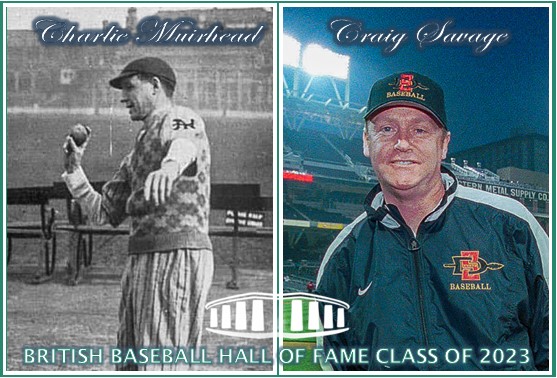
LONDON, U.K., 15 Dec. 2023 — The British Baseball Hall of Fame (BBHOF) is pleased to announce the Class of 2023, which features two ‘Game Builders’, those inducted for their contributions to grassroots sport, development of new players, and contributions to baseball in Britain. The Historic Committee selected Charlie Muirhead, while Craig Savage was the sole honouree from the Modern Ballot. A total of 52 men and women are now enshrined in the BBHOF for their superlative contributions to British baseball.
‘In sport, it is easy to focus on the star player, but it is the “game builder”—the organiser, the coach, the fundraiser—that paves the way for athletic success,‘ remarked Gabriel Fidler, Chair of the British Baseball Hall of Fame. ‘Our two inductees, Charlie Muirhead and Craig Savage, each worked tirelessly to foster grassroots baseball, the former in his adopted home, the latter in the town of his birth. Despite a difference of almost half a century between their periods of activity, each turned less-regarded teams into perennial national title contenders, secured impressive donations and grants, signed star players, and had remarkable success in international competition, all the while working as volunteers. This year’s British Baseball Hall of Fame inductees truly showcase the rich history, diverse nature, and quality of baseball in Britain.’
For almost two decades, Charlie Muirhead worked tirelessly to promote baseball in Britain. From at least 1918–34, the Canadian native helped start teams and leagues, hosted a baseball radio show, and organised exhibitions with elite players from the U.S. and Japan. His London-based All-Star Legionnaires won a European Championship at the club level in 1923, while he also introduced the game to new audiences, including one of the earliest women’s teams in Britain, through coaching and organising donations of equipment. On his death in 1949, the Gloucester Echo said of Muirhead that he was a ‘pioneer of baseball in Britain, and the founder and, for many years, secretary of the Anglo-American Baseball Association’.
During one of the most competitive eras in British baseball history (1993–2006), Craig Savage led the Brighton Buccaneers to six National Championship Finals in seven years, winning three, all the while setting a new standard for club organisation. After finishing runner-up in the 2000 European Cup B-Pool, Confederation of European Baseball Secretary General Gaston Panaye described Brighton as ‘the best British club side in forty years’. One of the winningest managers in British history, these accomplishments were achieved with a predominantly British roster that included five future British Baseball Hall of Fame inductees, 18 national team members, and four who played professionally in the U.S. Additionally, the native-born Brightoner secured multiple grants to build Brighton’s Pavilion Field, which became one of the top facilities in the country.
‘It’s such an incredible honour to have been balloted for the British Baseball Hall of Fame and elected as a first-year inductee,‘ remarked Savage. ‘I can’t quite believe that I am to be listed in a category alongside such historic influences on the game as Sir Francis Ley from the late 1890s and Sir John Moores from the 1930s, both of whom were responsible for investing heavily in the sport at a time when baseball was drawing significant crowds and enjoying huge exposure to the British public. This recognition is for all my colleagues and our players that were part of an incredible journey.’
‘These two inductees underscore one of baseball’s best attributes: anyone can join in and, not only that, but that one person can have a huge difference on a local community,‘ explained Fidler. ‘It also highlights the universal language of baseball—Savage grew up in Brighton and transformed youth and adult sport in the south east, winning the only three national titles ever claimed by a team from Sussex, while Muirhead was Canadian, but after returning from the Western Front in World War II, fell in love with London and remained in the city to teach new players, organise grand exhibitions and star player visits, and set up local leagues.’
‘Ongoing research into the almost 300-year history of baseball in the U.K. has revealed inspiring stories, new champions, and details of many other intriguing people and teams,‘ added the BBHOF Chair. ‘Muirhead was almost totally unknown before the dedicated research of elector Andrew Taylor revealed him to be one of the catalysts behind the explosion of baseball in Britain during and after World War II, and other icons are still being revealed. All of this important work is accomplished by volunteers, and further enhances the already rich archive of material at Project COBB, which shines an important light on British culture over the last 150 years. I look forward this year to hearing new stories told as we honour local trailblazers and heroes from the grassroots level to international sporting stars.’
Full candidate biographies and a glance at the Class of 2023 by the numbers are appended below. Details of the 2023 British Baseball Hall of Fame induction festivities will be released at a later date. Biographies, statistical highlights, and photos of the previous 13 classes of inductees can be found at bbhof.org.uk.
Next summer, only a few weeks after the third instalment of MLB’s London Series, baseball will celebrate the 275th Anniversary of the first recorded baseball game in history, which took place on 12 Sep. 1749 in Walton-on-Thames. The rich history of the sport since then—including a total of 94 known national champions between 1890 and 2023—led historian Joe Gray to form Project COBB for the purpose of ‘honouring our history, inspiring the future’. Project COBB is the archive for baseball in the UK, including the official archival resource for Great Britain Baseball national teams. Those interested in the broader history of baseball in Britain—including a list of all known national champions between 1890-2023, a wide variety of historical documents, statistics and other data, published research, and much more—should visit www.projectcobb.org.uk.
Out of this rich national archive of baseball in Britain grew the British Baseball Hall of Fame (BBHOF), founded in 2009. Its Board of Electors features 15 distinguished members of the British baseball community, including three Hall-of-Fame players, its most successful head coach, and multiple authors of the sport. Nominees may be proposed by members of the public, while electors and a panel of Regional Experts also recommend, research, and compose biographies of potential inductees. The Hall is endorsed by the national governing body of the sport, the British Baseball Federation. You can find the BBHOF at bbhof.org.uk.
If you have any records, statistics, clippings, programmes, or other items of interest not already featured in the archive that you are willing to scan, loan, or donate, you are encouraged to write to info@projectcobb.org.uk.
Charlie Muirhead | Category: Game builders | Year(s) on ballot: 2023
Secretary: Anglo-American Baseball Association (1924–34-); Organiser: London Americans (c. 1925–29); Broadcaster and Public Address Announcer (1934–38-). Also, Catcher: Canadian Records Office (-1918–19), London Canadians (1923–24), All-Star Legionnaires (1923), London Americans (c. 1925–34).
For almost two decades, Charlie Muirhead worked tirelessly to promote baseball in Britain. From at least 1918–34, the Canadian native helped start teams and leagues, organised exhibitions with elite players from the U.S. and Japan, and introduced the game to new audiences through coaching, including for women, and behind the microphone. On his death in 1949, the Gloucester Echo said of Muirhead that he was a ‘pioneer of baseball in Britain, and the founder and, for many years, secretary of the Anglo-American Baseball Association’.
Born in Toronto in 1890, Muirhead first appears in the public record in 1914 enlisting with the first contingent of the Canadian Expeditionary Force. Disclosing his occupation as a travelling salesman, his prior history (besides census returns) and, especially, his career in baseball is a mystery. After serving at the front line in 1915, he was sent back to England for the remaining years of the war for medical reasons, and served as a clerk in the Canadian Records Office (CRO) in London. As early as 1916, the CRO established a baseball team in the London area military baseball league, the Military and Hospitals Baseball League (organised by J.G. Lee, Class of 2021), and in 1918, the Anglo-American Baseball League.
It is in 1918 that Muirhead the baseball player comes to prominence. The CRO were the perennial losers of an eight-team league packed with major and minor league experience, yet Muirhead at catcher was to receive press recognition for his ability as a batter at the top of the lineup in both British publications (the Sportsman) and Canadian (the CRO Bulletin). It is possible he played for the CRO as early as 1916 and probable he continued to play until 1919 prior to demobilization.
Muirhead was to marry after the war and remained in London, where he continued to be involved in the game as player, administrator, and promoter, and was to a large degree the torchbearer for baseball in the capital. Playing for the London Canadians in 1922 in the revived London Baseball League (successor to the 1906–11 British Baseball Association), he was seemingly heavily involved in the ousting of the old governing body and its takeover by the London Post of the American Legion. He organised the All-Star Legionnaires, a London-based team of former Canadian and American servicemen in 1923, leading them to an unbeaten season and victory over Paris in the Huffer Inter-City Cup, which carried with it the title of European Championship. The Legionnaires contested the same cup the following year as well, although it lost the first game against Paris and is unknown if it won the best-of-three series. The same season, Muirhead invited Fred Lewis (Class of 2010) and his Chipping Norton team to London for the first time, bringing them into the ‘fold’ as part of a vision for expanding the game outside of the capital.
Some later publications credited him with being central in inviting the New York Giants and Chicago White Sox to London in 1924. Although Arlie Latham, now calling himself the Commissioner of British Baseball, was undoubtedly heavily involved, courtesy of his former Major League contacts, it was Muirhead and his newly formed Anglo-American Baseball League that were to be the principal beneficiaries, receiving a four-figure cheque that secured the immediate future of the game in Britain, along with uniforms and equipment. From then on, Muirhead proudly wore the N.Y. Giants’ monogram on his London Americans uniform.
From the mid-1920s, Muirhead revived the London Americans ballclub, and along with organizing various novelty and exhibition games from opposition as varied as theatrical teams, US Navy teams, and Japanese university teams, he worked continuously towards his objective of a professional British Baseball league.
In 1925, he recruited Surrey and England cricketer Percy Fender, a nascent baseball fan, to play for the London Americans and the connection was reciprocated when in 1926 Muirhead was employed as a specialist fielding coach for the Surrey County Cricket Club with a view to introducing baseball skills to the cricketers, the first such instance of a baseballer being employed in cricket.
Perhaps his greatest coup was signing the recently retired Ty Cobb to the London Americans with a view to his playing an exhibition game at Wembley Stadium in September 1929. Legal difficulties prevented the game from taking place, but Cobb, resplendent in his London Americans uniform, provided an exhibition for spectators and cameras of baseball skills. Programmes from the late-1920s included many pages of correspondence between Muirhead and a variety of persons in the United States, chiefly promoting the game in Britain and inviting all comers to tour.
By the beginning of the 1930s, the Anglo-American Baseball Association, under Muirhead’s tenure, incorporated free youth coaching sessions and encouraged the development of women’s baseball as part of its mandate, incorporating an annual fixture between women’s teams (usually from west end shows) and in 1930 providing equipment, coaching and support to the formation of two women’s teams from Middlesex. It also commenced to touring the country to bring the game to new audiences.
In 1934, in his early 40s—and still regularly playing as catcher—Muirhead branched out into broadcasting with his own radio show ‘Canadian Backchat and Baseball Rooting’, possibly the first dedicated baseball programme on British radio. By this point, newspapers had designated him the principle pioneer of post-war baseball in London.
Although there is no overt evidence to suggest he was directly involved in the formation of the London Major Baseball League, such was the esteem in which he was held—and the public recognition that he had—that he was to be employed as an announcer for a number of teams, including high-flying West Ham and the Hackney Royals.
The paucity of records for the period 1918–34 means any statistical overview of his playing career is impossible, but his participation in the Anglo-American Baseball League against Major League talent, his noted hitting ability in the available reports from that league—not to mention his participation in the All-Star Legionnaires’ unbeaten 1923 season against domestic and international teams—all imply some sporting ability. But his chief contribution, no doubt, must be his tireless promotion of the game throughout the 1920s and early 1930s, bridging the gap between the folding of the British Baseball Association in 1911 and the Golden Age of British Baseball beginning in the mid-1930s, for which he certainly set the scene.
Craig Savage | Category: Game builders | Year(s) on ballot: 2023
Chairman and Head Coach: Brighton B.C. (1993–2006); Assistant Coach: Great Britain (2006).
During one of the most competitive eras in British baseball history, Craig Savage led the Brighton Buccaneers to six National Championship Finals in seven years, winning three, all the while setting a new standard for club organisation. After finishing runner-up in the 2000 European Cup B-Pool, C.E.B. Secretary General Gaston Panaye described Brighton as ‘the best British club side in forty years’. These accomplishments were achieved with a predominantly British roster, including five future British Baseball Hall of Fame inductees, 18 national team members, and four professionals. Additionally, the native-born Brightoner secured multiple grants to build Brighton’s Pavilion Field, which became one of the top facilities in the country.
‘If you look at the way the Buccaneers were built from the ground up, the number of youth and adult teams that fed into the club, and the way the team produced at the national and European stage, Craig was clearly one of the most influential people in the ‘90s in British baseball,’ concluded long-time GB player and coach Will Lintern, who played for Savage. ‘Craig spearheaded signing one or two foreign players and, along with Bracknell, was the first to give opportunities to young GB Baseball prospects. [He also] developed commercial relationships, built the best field in Britain until Farnham Park, and changed the way that the national tournament was played [by encouraging] the BBF to create the Final Four.’
After a decade as a player for the South Coast/Brighton Buccaneers, Savage took on the roles of chairman and head coach as well and built the Bucs into the biggest club in the country during this period. There were multiple adult and junior teams in Brighton and other competitive senior baseball teams across Sussex and Kent competing within the BBF, plus a massive schools baseball programme at the junior and secondary levels across the city.
Savage did not limit himself only to Brighton itself, however, helping Tonbridge when it ‘was at a bit of a fork in the road,’ as Lintern explained. ‘Craig came in and helped Tonbridge, provided uniforms, helped build them a field and taught them how to maintain it, and [offered] its advanced players [the] opportunity to play at the national level.’
The club signed a number of high-profile sponsorships under Savage’s guidance, allowing it to function on an almost semi-professional basis. Most impressively, significant grants from the Foundation for Sport and the Arts and Brighton Borough Council funded construction of Pavilion Field, the club’s purpose-built facility, which opened in May 1996. Immediately recognised as one of the top ballparks in Britain, Pavilion Field hosted the BBF National Finals from 1998–2004 and the 2000 BBF Knockout Cup Final, with the atmosphere produced becoming the standard by which future championships were measured.
Savage was already well-regarded as a manager by 1993, when he managed the National Premier League All-Stars against Great Britain, losing in extra innings. After taking over the reins of the Buccaneers that year, Savage steadily built Brighton into a winner, guiding the Bucs through the gauntlet of BBF South playoffs all the way to the national title game from 1999–2003, appearing again in 2005. Brighton lifted the National Championship trophy in 1999 before back-to-back titles in 2001 and 2002, setting an all-time record for consecutive appearances in the national final (five) that was only broken in 2019 by the London Mets.
In 1999, the Buccaneers became the first British club to have a former player taken in the Major League Draft. A 19-year-old John Foster had suited up for Brighton in 1997, at one point turning in a 16-strikeout game. Eighteen months later, the Atlanta Braves drafted Foster the 25th Round. Foster made his big-league debut in 2004, recording a win in relief in his first game. The southpaw went on to appear in 90 MLB games over parts of three seasons.
The 2000 season may not have produced a British champion from Brighton, but the Bucs represented the U.K. in the European Cup B-Pool, splitting two group games before becoming the first British team to ever a win a playoff game in a continental event, defeating France’s Lions du Savigny. A loss to the Brasschaat Braves in the final denied Brighton the chance to become the first British team to win a cup, which occurred only in 2022. Later that year, the Bucs did win the Southern League’s postseason title after taking the Group B regular season.
The 2003 Brighton squad was a further testament to Savage’s ability to assemble top baseball talent, featuring two future U.S. independent league players, Darren Heath and Gary Tongue. A year earlier, Savage had signed Gavin Marshall out of indy ball, Marshall then famously pitching the Bucs to a 5-1 win over Windsor in the 2002 National Championship final. At least three other players took their skills to U.S. universities, a rare occurrence at the time.
In 2003 and 2004, Savage joined Hall-of-Famer Tony Gwynn for spring training with San Diego State University. In the second year, he remained on Gwynn’s staff into the start of the regular season and was with the squad when it eclipsed the previous NCAA single-game attendance record in the first-ever game to be played at Petco Park [pictured above].
Overall, Savage had a 196–129 record in regular season play and an impressive 20–11 mark in the playoffs. Including a few known cup games, his overall mark of 224–149 (.601) between 1993–2006 likely ranks among the best in British baseball. In total, during Savage’s time as skipper, Brighton featured five future British Baseball Hall of Fame inductees—Nick Carter, Martyn Dutton, Alex Malihoudis, Gavin Marshall, and Simon Pole.
‘As a British Baseball Hall of Fame inductee, I can wholeheartedly attribute Coach Savage as one of the two people who helped me to receive the prestigious honour as, without his expert guidance and tutelage, I would not have had such an illustrious baseball career,’ explained Nick Carter (Class of 2017). ‘Incidentally, the other person who massively [influenced] my baseball career was Mrs. Margaret Borley, also a Hall of Fame inductee.’
During the Buccaneers’ run to British National Championship Finals in 2003, Savage began the transition to coaching professional cricket. Sussex CCC—and soon-to-be England—manager Peter Moores headhunted Savage to help prepare the squad for the onset of the new T20 format. In that first season of 2003, he was an integral part of the coaching staff that steered Sussex to its first-ever County Championship in the club’s more than 100-year history. He also became heavily involved in coaching blind cricket, helping to prepare the England Blind Cricket Team for its Pakistan Series.
[1] Includes 1993–94 Knockout Cups, 1995 London Tournament, and 2000 European Cup B-Pool. It excludes all Brighton Buccaneers B results.
[2] Unknown if Brighton entered its NBL team in the 2000 Knockout Cup.







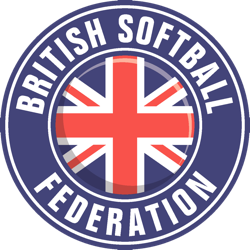




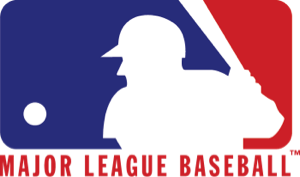

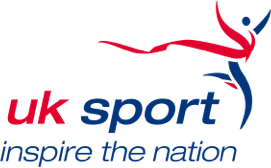
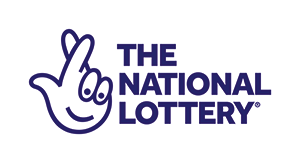
.png)


